Though it is not often talked about, domestic violence continues to occur on a wide scale throughout the United States and has a significant role in the city of Madison. In 2016 alone, Dane County law enforcement received complaints of domestic abuse involving over 3,000 victims. One must also take into account the amount of domestic abuse that likely goes unreported, due to fear of backlash or lack of resources.
That is why the University of Wisconsin Law School has begun to help. They recently created a new program — the VOCA Restraining Order Clinic — named after the Victim of Crimes Act, which has allocated federal funds to victim support programs since 1984.
The aim of the clinic is to provide restraining order services for those who suffer from domestic abuse, and aid those who wish to enact a restraining order for their own protection. According to the Wisconsin Department of Justice, issuing a restraining order restricts someone from hurting the victim — forcing them to move out, stay away from the victim, end all contact with the victim or stop harassing them.
Obtaining a restraining order includes two main parts: petitioning for a temporary restraining order, and appearing in court to gain the judge’s approval of a long-term restraining order, which can last for up to 10 years. Pursuing a restraining order is a long and tedious process, especially without legal counsel. This is why the VOCA Restraining Order Clinic is partnering with domestic abuse clinics in Dane, Jefferson, Rock and Sauk counties to receive referrals of those who need assistance.
UW Law students will provide the majority of services, with the help and guidance of licensed attorneys. Students’ duties will include interacting with clients, writing and filing court documents, preparing for hearings and participating in cross-examination as well as direct examination.
Working with domestic abuse victims will teach UW’s future lawyers how to work with troubled clients and understand the struggles victims face — helping them develop empathy and a better understanding of trauma. Not only is this a great opportunity for students to gain hands-on experience, but it is also an intelligent use of resources by the UW Law School to give back to the community and provide the public with much-needed services.
Furthermore, this type of public service aligns with the Wisconsin Idea, which broadly encompasses the university’s dedication to serving the community. Especially in an era of public and political strife, the Wisconsin Idea is more important than ever.
The idea for the clinic was actually created by the Wisconsin state Legislature’s Committee on Access to Legal Services, and the school’s administrators worked with the Wisconsin Department of Justice to gain funding for the clinic. This is a great example of UW working with the government to improve society and provide valuable services to those who need them, as well as enriching its students’ education with the opportunity for hands-on experience.
The Law School plans to open the clinic in January 2019, requiring students to commit for the semester, in which they will take on 2-3 cases. There has already been a large interest from UW law students, who are likely eager to gain experience and contribute to such an important and meaningful cause.
The Wisconsin Idea should not only pertain to UW, however. All universities should be committed to providing public service for their communities. With the collaboration of students, faculty and other organizations, universities like UW can greatly improve society and the lives of fellow community members.
Courtney Degen (cdegen@wisc.edu) is a sophomore majoring in political science and intending to major in journalism.


